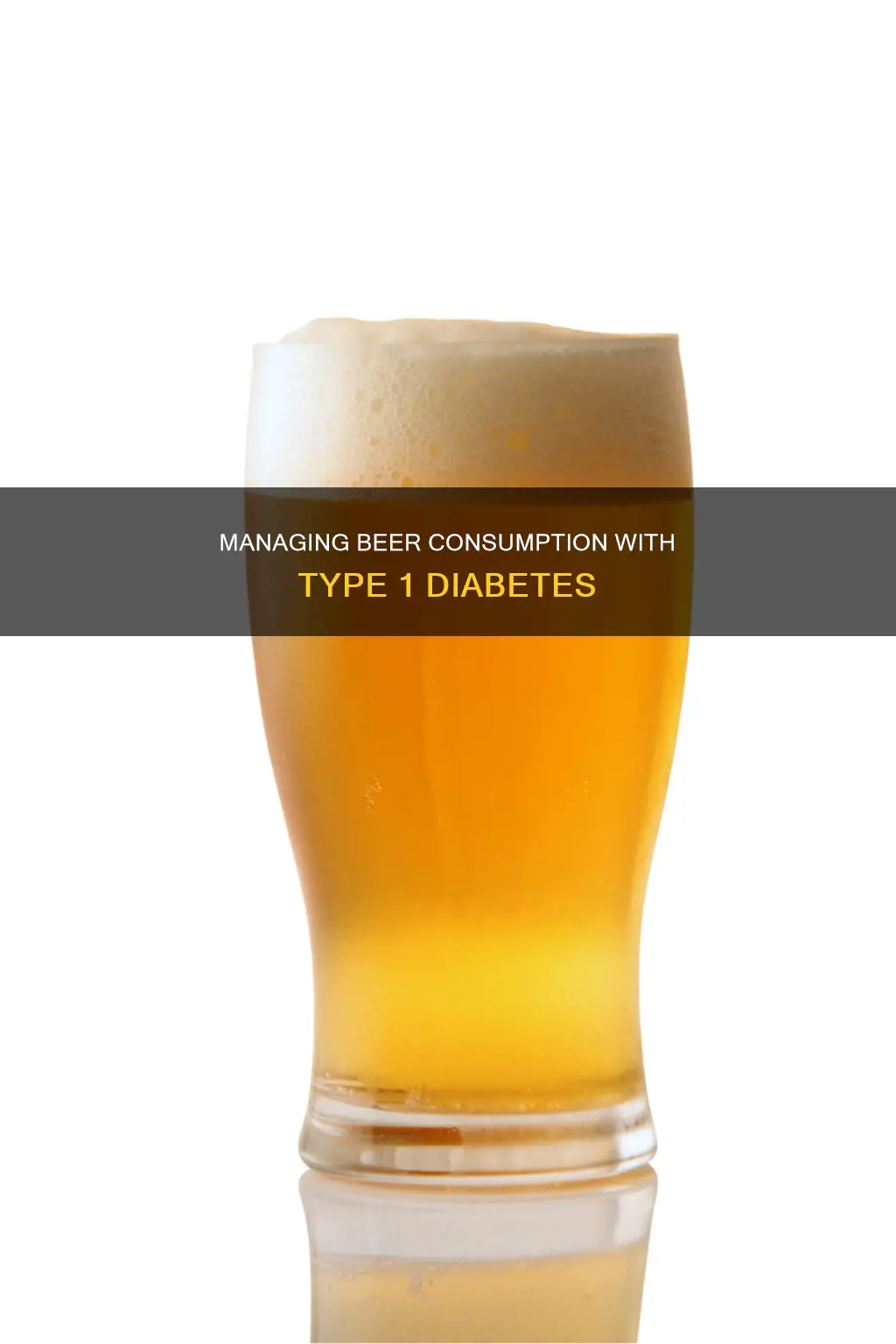
People with type 1 diabetes can drink beer, but there are some important safety considerations to keep in mind. Alcohol can affect blood sugar levels and interact with diabetes medications, so drinking in moderation is key. It's recommended that men with diabetes limit themselves to two drinks per day and women with diabetes to one drink per day. When it comes to beer, it's best to choose light beers, which have fewer carbs and a lower alcohol content. It's also important to avoid drinking on an empty stomach and to monitor blood sugar levels regularly before, during, and after drinking.
| Characteristics | Values |
|---|---|
| Alcohol consumption recommendations | No more than one drink a day for women and up to two drinks a day for men |
| "Binge drinking" | Drinking more than four drinks (for women) or five drinks (for men) within two hours |
| One serving of beer | 12 ounces |
| "Light" beers | Lowest in carbs, calories, and alcohol |
| Hoppy craft beers | Higher in carbs, calories, and alcohol |
| Alcoholic drinks with mixers | Carb-heavy |
| Spirits like whiskey | Most diabetes-friendly when consumed straight |
| Wine | More diabetes-friendly than beer |
| Calories in a typical beer | 95-219 |
| Carbohydrates in a typical beer | 5-20 |
What You'll Learn

Alcohol and blood sugar levels
Alcohol can have a rollercoaster effect on blood sugar levels, causing an initial surge, followed by a significant drop many hours later. This is because many alcoholic drinks contain blood sugar-raising carbs, and alcohol itself lowers blood sugar.
When you consume alcohol, your liver focuses on processing and removing this toxic substance from your body, rather than producing glucose. This means that the steady release of stored glucose (glycogen) is interrupted, and blood sugar levels can drop. Additionally, alcohol slows down digestion, which can further contribute to low blood sugar levels.
The risk of hypoglycaemia (low blood sugar) is particularly high for those with type 1 diabetes who are taking insulin or other diabetes medications. Alcohol can interfere with the liver's ability to regulate blood sugar levels, and the symptoms of hypoglycaemia can be mistaken for drunkenness. It is crucial to monitor blood sugar levels regularly and be prepared to treat hypoglycaemia if needed.
To minimise the risk of hypoglycaemia, it is recommended to avoid drinking on an empty stomach and to consume food, especially carbohydrates, before and during alcohol consumption. It is also important to stay hydrated by drinking plenty of water.
While moderate alcohol consumption may have some health benefits, excessive drinking can lead to weight gain and increased health risks, including raised blood pressure, nerve damage, dehydration, sleep disturbances, cancer, and heart disease. Therefore, it is essential for individuals with type 1 diabetes to drink in moderation and be mindful of how alcohol affects their blood sugar levels.
Beer and Ulcers: Is It Safe to Drink?
You may want to see also

Drinking on an empty stomach
To avoid hypoglycaemia when drinking, it is recommended to have food handy and to pace yourself, limiting yourself to no more than one drink per hour and no more than three or four drinks total for the day. It is also important to stay hydrated by drinking plenty of water.
Warm Beer: A Cultural Preference or Climate Influence?
You may want to see also

How much is too much?
When it comes to drinking beer, moderation is key for people with type 1 diabetes. Excessive alcohol consumption can lead to several health complications, including a potentially lethal side effect called alcoholic acidosis, which is more likely to occur after binge drinking. Therefore, it is important to follow the recommended guidelines for alcohol consumption.
The general recommendation for alcohol consumption is the same for people with type 1 diabetes as it is for the general population. According to the American Diabetes Association (ADA), men should limit themselves to no more than two drinks per day, and women should have no more than one drink per day. These guidelines are consistent with the USDA guidelines for people without diabetes.
It is important to note that the serving size for one drink is typically defined as 12 ounces of beer, 5 ounces of wine, or 1.5 ounces of distilled spirits. However, in reality, many bars and restaurants serve larger portions. Therefore, it is crucial to be mindful of the actual serving sizes when drinking.
To avoid excessive alcohol intake, it is recommended to pace yourself when drinking, especially during sporting events or other social occasions. A good rule of thumb is to have no more than one drink per hour and to limit yourself to no more than three drinks for women or four drinks for men in a day. Staying hydrated by drinking plenty of water is also essential.
Additionally, drinking on an empty stomach should be avoided, as it can increase the risk of hypoglycemia. Eating a meal with slow-acting carbs and fat or protein before drinking alcohol can help prevent hypoglycemia and also aid in processing alcohol more effectively.
It is worth noting that the effects of alcohol on blood sugar levels can last up to 24 hours after drinking. Therefore, it is crucial to monitor blood sugar levels regularly before, during, and after drinking.
In summary, while people with type 1 diabetes can safely consume alcohol, including beer, moderation is crucial to avoid health complications. Following the recommended guidelines, pacing yourself, eating before drinking, and monitoring blood sugar levels are essential steps to ensure a safe and enjoyable drinking experience.
Calories in Beer vs Mixed Drinks: Which is Worse?
You may want to see also

Alcohol and weight gain
People with type 1 diabetes do not need to cut alcohol out of their diet. However, there are some important safety considerations to keep in mind. Firstly, alcohol competes with your liver's ability to make glucose when your blood sugar is low, which can lead to dangerously low blood sugar levels. This effect can last up to 24 hours after drinking. Additionally, drinking alcohol can impair your judgement, so you may not realise that your blood sugar levels are dropping. To prevent hypoglycaemia, it is recommended that you eat before drinking and regularly monitor your blood sugar levels. It is also important to stay hydrated by drinking plenty of water.
Regarding alcohol and weight gain, there are several ways in which alcohol consumption may contribute to weight gain. Firstly, alcohol is high in calories and provides empty calories, meaning it contains calories but no nutrients. Alcohol can also increase your appetite and lead to cravings for salty and greasy foods. Additionally, drinking alcohol can impair your judgement when it comes to food choices, leading to the consumption of unhealthy foods. The relationship between alcohol consumption and weight gain is complex and influenced by various factors, including drinking patterns, physical activity levels, sleep habits, and genetic factors. While moderate alcohol consumption may not necessarily lead to weight gain, heavy drinking has been more consistently associated with weight gain. Therefore, it is important to monitor your alcohol consumption and practice mindful drinking if you are concerned about weight gain.
Beer's Power: Removing Trapped Gas, Always
You may want to see also

Alcohol and diabetes medication
Alcohol and diabetes is a tricky subject. People with diabetes do not need to cut alcohol out of their diet. However, drinking can make you more likely to have a hypo, because alcohol interferes with your blood sugar levels. It can also affect your weight, as there are a lot of calories in alcoholic drinks.
If you are on insulin or other anti-hyperglycemic medications, drinking can lead to dangerously low blood sugar up to 24 hours after you stop drinking. Alcohol can also cloud your judgment, so you may not realise that your blood sugar is low.
To prevent hypoglycaemia, don't drink on an empty stomach. Make sure you have food before you start drinking and keep checking your blood sugar. It's also important to carry hypo treatments with you and always wear some medical ID.
If you are taking insulin, you might need to change your dose depending on your blood sugar levels. Talk to your doctor about what you should be doing.
Alcohol-Free Beer: Safe Treat for Kids?
You may want to see also
Frequently asked questions
Yes, a type 1 diabetic can drink beer, but it is important to do so in moderation and with caution. Alcohol can affect blood sugar levels and interact with diabetes medications, so it is crucial to monitor blood sugar levels closely and follow certain safety guidelines.
Beer typically contains carbohydrates that can cause an initial surge in blood sugar levels. However, alcohol itself lowers blood sugar by interfering with the liver's ability to produce glucose. This dual effect of beer can lead to a roller coaster of blood sugar levels, with an initial spike followed by a significant drop several hours after drinking.
It is recommended that type 1 diabetics follow the general alcohol consumption guidelines of no more than one drink per day for women and no more than two drinks per day for men. It is crucial to not drink on an empty stomach, as it can increase the risk of hypoglycemia. Eating before drinking and choosing low-carb or "light" beers can help manage blood sugar levels. Regularly monitoring blood sugar levels before, during, and after drinking is essential, as well as keeping hypo treatments and diabetes kits close at hand.
Wine and spirits are generally considered more diabetes-friendly than beer due to their lower carbohydrate content. Straight spirits, such as whiskey, have no carbohydrates and are considered the most diabetes-friendly option when consumed without sugary mixers. However, it is important to remember that alcohol itself lowers blood sugar, so even these options should be consumed in moderation and with caution.







